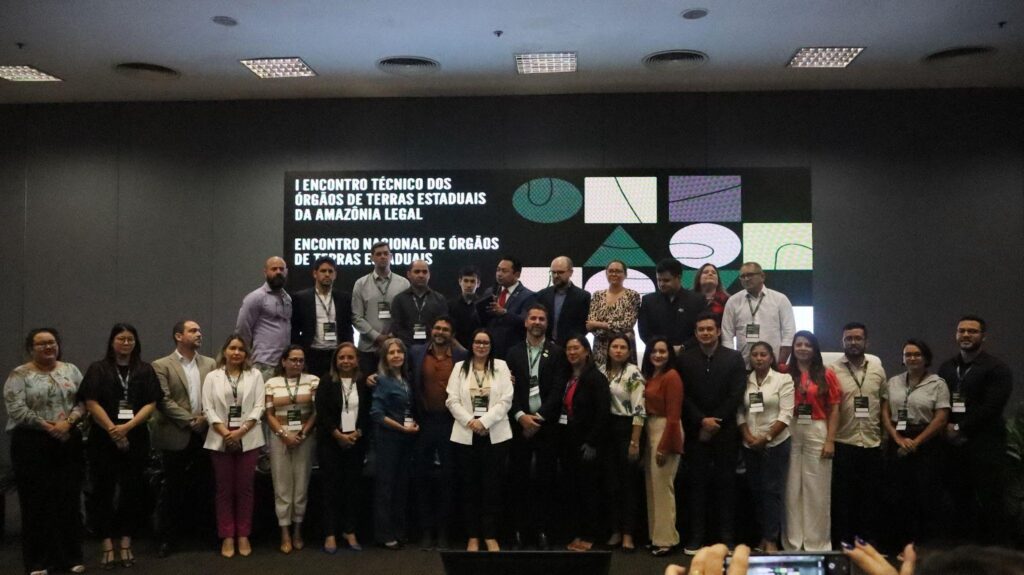Growing maturity of Quilombo Discussion Forum in the state of Pará boosts progress regarding land titling for descendants of runaway slaves

On November 19, during Brazil’s Black Awareness Day celebrations, the state government of Pará formally presented 17 land title packages to residents of quilombos (settlements of descendants of runaway slaves) across 10 municipalities. This land tenure reform covers an area equivalent to 23,000 soccer fields and will directly benefit 1,406 families. Based on the recently established Quilombo Discussion Forum, the state government is developing a land tenure governance model involving multiple stakeholders to plan and execute actions to guarantee the territorial rights of these communities. This initiative has led to significant progress on the land agenda.
By awarding these new land titles, Pará has reinforced its national leadership in regularizing quilombo lands. Since 2019, 45 land title packages have been issued, benefiting 3,801 families and regularizing 73,000 hectares of traditional lands. Next year, the state plans to reach the milestone of 100 land title packages awarded to quilombo residents.
“Every year, we increase the number of quilombo land titles in the state. Pará ranks first in Brazil for issuing these land titles. Land titles are important as they give legal security to these people, who have been living in their communities and fighting for their land for a long time. Their land represents their struggle and their culture,” said the president of the Pará State Land Institute, Bruno Kono.
The land tenure agenda, led by the Pará State Land Institute, receives technical support from the Amazon Environmental Research Institute and is backed by Fundo Vale, which provides technical advice, studies and data to inform the planning of strategic actions and contribute to achieving these results.
Since 2020, the Amazon Environmental Research Institute has collaborated with the Pará State Land Institute to develop solutions to enhance land tenure procedural analysis and legal instruments in the state of Pará. The aim is to improve land governance mechanisms in a transparent, fair and equitable way, as well as strengthening institutional coordination and spaces for social participation.
“The lack of land tenure reform is one of the biggest barriers to social and environmental development in the Amazon. This partnership is strategic for Fundo Vale, because land tenure regularization in Pará helps ensure that more rural producers and traditional communities are included in the production chain of socioeconomic initiatives that keep the forest standing and protect social and biological diversity,” said Márcia Soares, Fundo Vale’s Amazon and partnerships manager.
Meeting of State Land Institutes
On December 9, 10 and 11, the Meeting of State Land Institutes was held, bringing together representatives of public and private sector institutions and civil society to share knowledge and to debate and structure innovative solutions in the area of land tenure reform and territorial governance in Brazil, with a special focus on the Amazon. The meeting, which took place in an atmosphere of dialogue and cooperation, discussed and reflected on challenges and opportunities related to this subject.
During the event, a study called “State of the Art in Land Governance” was presented. This document, produced by the Brazilian Amazon Consortium and supported by Fundo Vale, sets out different strategies for implementing land policy in Amazonian states in light of infrastructure, operational, technological and other challenges. Among other things, the study recommends strengthening land governance through social forums, such as working groups and committees, which can facilitate land titling processes and help align them with local circumstances.
“This study provides a snapshot of how land governance in the Amazon is structured, highlighting the successful experiences of each state and pointing to the need for an integrated vision of the dynamics involved in its implementation. It serves as a strategic foundation to guide investments, strengthen public policies and promote greater synergy between local, state and federal initiatives,” said Raquel Poça, public policy analyst at the Amazon Environmental Research Institute.
Accompanied by Fundo Vale, the event was attended by representatives of key organizations, including the Ministry for Agrarian Development, the National Agrarian Reform Agency, the Brazilian Amazon Consortium’s Land Governance Chamber, the Pará State Land Institute, the National Land Registration Institute, the National Justice Council, the federal government’s Property Secretariat and leading research and technology institutions, such as the Amazon Environmental Research Institute.
The participants discussed a variety of topics, including advances in land tenure reform, strategies for implementing comprehensive land governance, the use of emerging technologies such as georeferencing, artificial intelligence and blockchain, and prospects for greater integration between public policies, rural development and environmental protection. The launch of the Brazilian Lands Platform, presented by the Ministry for Agrarian Development, was a standout moment in the event, symbolizing a significant technological advance for transparency and traceability in the sector.
The second day focused on discussions about inter-federative coordination and fundraising, featuring activities that involved dialogue between thematic groups. It concluded with the drafting of a joint statement that outlined the future agenda and next steps, which will serve as a guide for continuing the actions discussed.
On the last day, the participants were invited on a guided tour of the Pará State Land Institute, where they experienced local culture to the sound of carimbó music and tasted traditional açaí berries.
